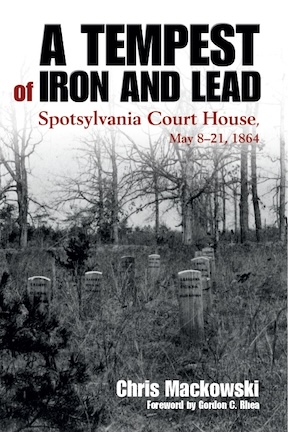Writing Tempest: John Haley’s Soundbite Wins the Title
 As a researcher, I’m always scouring primary sources to find good “soundbites.” It comes from my days—in what seems a lifetime ago—as a radio journalist. I would interview someone and look for the best quotes to help illustrate the story I was reporting. I have found the same goes for historical research: you look for the well-turned phrase or colorful description that breathes life into a story.
As a researcher, I’m always scouring primary sources to find good “soundbites.” It comes from my days—in what seems a lifetime ago—as a radio journalist. I would interview someone and look for the best quotes to help illustrate the story I was reporting. I have found the same goes for historical research: you look for the well-turned phrase or colorful description that breathes life into a story.
It’s become common practice in the history field to title books based on a quote. And so, as I wrote my Spotsylvania book, I kept my eyes peeled for soundbites that might be adapted into good titles. I wanted to have several to choose from—but as I built my list, nothing on it really jumped out at me as the one.
Then I re-read John Haley’s account of the fight on May 12—the fight for the Mule Shoe salient.
John fought as a private for the 17th Maine, and his postwar memoir, The Rebel Yell and the Yankee Huzzah (Down East Books, 1985), stands as my favorite soldier account of the war. He writes with color and vigor, and his sense of snark runs deep. His recounting of the fight for the Mule Shoe stands out as particularly excellent.

And it was there that I found the soundbite I’d been looking for. I’d found the phrase.
“We had gained a foothold, and if not dislodged, we would soon be on Lee’s flank,” Haley wrote of the morning Federal assault. “Every Confederate realized the desperate situation and every Union soldier knew what was involved. For a time, every soldier was a fiend. The attack was fierce—the resistance fanatical. We captured one of their strongest entrenchments, but it was done in a tempest of iron and lead, in a rain of fire.”
A tempest of iron and lead.
If that didn’t explain the fight for the Mule Shoe, nothing did—particularly with the “rain of fire,” as there was plenty of rain and fire. A twenty-two-inch oak tree was felled by bullets in that tempest. As I ask groups when I give talks or tours about Spotsy: How much soft lead does it take to cut down twenty-two inches of hard oak?
The phrase jumped to the top of my list. It jumped out at publisher Ted Savas, too. “Sometimes you just hear it,” he said.
I’m proud to feature John Haley’s words as the title of the book. He’s a writer I admire. Postwar, he returned to his hometown of Saco, Maine, and became the town’s librarian for decades—something else I admire. The book features a never-before published image of Haley in his retirement years (thanks to Brian Swartz and the Saco Public Library).
I encourage you to seek out John Haley’s words for yourself.
————
A Tempest of Iron and Lead: Spotsylvania Court House, May 8–21, 1864 is available from Savas Beatie here.
If you like exciting first person accounts, check out my book “The Greatest Escape, a True American Civil War Adventure”. It’s based on and features 50 eyewitness accounts of the escape by its participants. Since all the escapees were officers, all could read and write well, and they wanted to record their personal experiences of this greatest of all American escapes.